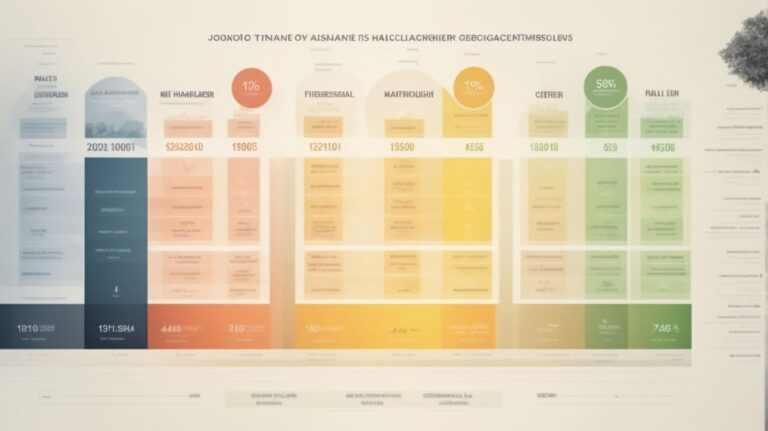Are you considering pursuing a PhD in Psychology? Wondering what career opportunities are available once you’ve completed your degree?
In this article, we’ll explore the benefits of pursuing a PhD in Psychology, the skills and knowledge you’ll gain, and the various career options available to you. We’ll also discuss strategies for securing employment after completing your PhD, including networking, gaining practical experience, and tailoring your job search to different opportunities.
Whether you’re just starting your academic journey or are nearing completion of your degree, this article will provide valuable insights for your future career in psychology.
Contents
- 1 Key Takeaways:
- 2 What is a PhD in Psychology?
- 3 Why Pursue a PhD in Psychology?
- 4 What Skills and Knowledge are Gained from a PhD in Psychology?
- 5 What are the Career Options for Someone with a PhD in Psychology?
- 6 What are the Strategies for Securing Employment after a PhD in Psychology?
- 7 What are the Tips for a Successful Job Search?
- 8 Frequently Asked Questions
- 8.1 What are some useful strategies for securing employment after completing a PhD in Psychology?
- 8.2 How can I leverage my PhD in Psychology to stand out in the job market?
- 8.3 What types of positions can I pursue with a PhD in Psychology?
- 8.4 What networking opportunities should I explore to secure employment after my PhD?
- 8.5 How can I make my job application stand out with a PhD in Psychology?
- 8.6 Is it important to have a strong online presence when looking for employment after my PhD in Psychology?
Key Takeaways:
What is a PhD in Psychology?
A PhD in Psychology is a doctoral degree that involves advanced study and research in the field of psychology, leading to expertise in various psychological theories, methodologies, and applications.
The typical duration of a PhD in Psychology ranges from 5 to 7 years. This includes coursework, intensive research, and the completion of a dissertation. During the program, students delve into specialized areas such as cognitive psychology, developmental psychology, social psychology, and clinical psychology.
The coursework often includes advanced seminars, statistics, research methods, and specialized topics relevant to the student’s chosen area of interest. Students are also required to engage in independent research projects. They work closely with faculty advisors to develop original studies that advance the field of psychology.
Why Pursue a PhD in Psychology?
Pursuing a PhD in Psychology offers the opportunity to delve deeper into the complexities of human behavior, contribute to impactful research, and uncover truths that can drive positive change in various contexts.
Undertaking a pursuit of PhD in Psychology is rooted in the desire to explore the intricate mechanisms that define human cognition, emotion, and behavior. It provides a platform to significantly contribute to impactful research, addressing critical societal issues such as mental health, decision-making, and social dynamics.
The quest for truth in understanding the human mind is intertwined with the pursuit of solutions that can positively impact individual lives and communities at large. The intellectual fulfillment derived from unraveling the mysteries of human behavior, and contributing to the body of knowledge in psychology, propels individuals towards advancing the field and creating meaningful change.
What Skills and Knowledge are Gained from a PhD in Psychology?
A PhD in Psychology equips individuals with advanced research skills, critical thinking abilities, specialized knowledge in specific psychological areas, and strong communication and writing skills, laying the foundation for diverse career paths within psychology and related fields.
Conducting extensive research and developing a deep understanding of human behavior enables individuals to contribute to the field of clinical psychology, data science, and various other specialized areas.
The development of critical thinking and analytical skills allows for the effective evaluation and interpretation of psychological data, which is essential for evidence-based practice and research.
The ability to communicate complex ideas and findings to diverse audiences is invaluable for roles in academia, clinical settings, or even in corporate environments where psychological insights are increasingly valued.
Advanced Research Skills
The pursuit of a PhD in Psychology fosters the development of advanced research skills, enabling individuals to engage in rigorous empirical inquiries, utilize various research methodologies, and contribute to the evolving body of psychological knowledge.
During the research-intensive journey of a PhD program, students delve deeply into investigating complex psychological phenomena, applying quantitative and qualitative research methods to formulate and test hypotheses. They gain practical research experience, designing experiments, collecting and analyzing data, and presenting findings at conferences, honing their ability to critically evaluate existing literature and develop novel research questions.
The exposure to interdisciplinary collaborations and diverse research contexts give the power tos PhD candidates to adapt their research approaches and think innovatively, further enriching their methodological repertoire. Through such immersive experiences, they cultivate a keen awareness of the ethical considerations and the impact of their research on both scholarly discourse and real-world applications.
Critical Thinking and Problem-Solving Abilities
A PhD in Psychology nurtures critical thinking and problem-solving abilities, enabling individuals to analyze complex psychological phenomena, evaluate diverse perspectives, and propose innovative solutions to address behavioral and mental health challenges.
Graduate students in Psychology engage in rigorous research, applying advanced analytical approaches to unravel the complexities of the human mind and behavior.
Through the exploration of various research methods and theories, they develop an acute awareness of the subtleties inherent in mental health concerns and psychological phenomena.
During their PhD journey, students refine their ability to think critically, question assumptions, and synthesize divergent viewpoints.
These skills are crucial for interpreting complex data sets, designing effective interventions, and contributing to evidence-based practice within the field of psychology.
Specialized Knowledge in a Specific Area of Psychology
PhD candidates gain specialized knowledge in a specific area of psychology, such as clinical psychology, counseling psychology, or health psychology, which prepares them for roles in clinical practice, consulting, research, or teaching.
Clinical psychology focuses on assessing and treating mental illness in clinical settings. This field prepares PhD candidates to work in places like psychiatric hospitals, mental health centers, and private practices, where they can help individuals with psychological disorders. Counseling psychology, on the other hand, trains professionals to provide therapy, guidance, and support to those facing personal, social, vocational, and emotional challenges.
Strong Communication and Writing Skills
Completing a PhD in Psychology enhances individuals’ communication and writing skills, give the power toing them to convey complex psychological concepts effectively, engage in teaching and management roles, and contribute to the dissemination of psychological knowledge.
Advanced academic research and writing skills developed in a PhD program facilitate the articulation of intricate theories and findings, aiding psychologists in effectively communicating with diverse audiences. The analytical and critical thinking honed during the program equips individuals with the ability to decipher complex information and present cogent arguments.
These refined communication and writing proficiencies are invaluable when undertaking teaching and mentoring responsibilities within educational institutions or organizational settings. The proficiency to impart knowledge in a comprehensive and engaging manner is crucial for conveying psychological principles to students and colleagues.
In the realm of management, the adept communication and writing abilities cultivated through a PhD program are vital for leadership roles in psychological organizations and research settings. The capacity to articulate visions, develop strategies, and communicate effectively with diverse stakeholders is pivotal in inspiring and guiding teams, advancing research initiatives, and fostering organizational growth.
What are the Career Options for Someone with a PhD in Psychology?
Individuals with a PhD in Psychology have diverse career options, including academic positions, clinical psychologist roles, research positions, and opportunities in consulting psychology, offering avenues to contribute to health services, management, and the transition between academia and industry.
Academic positions for PhD holders in Psychology can involve teaching, mentoring, and conducting research at universities and colleges. Many professionals choose to pursue tenure-track positions or strive for leadership roles within academic institutions.
Clinical psychologists with a PhD often work directly with individuals, couples, or families to provide counseling, therapy, and psychological assessments in various healthcare settings such as hospitals, private practices, and community mental health centers.
Research roles in psychology are diverse, ranging from conducting empirical studies, analyzing data, publishing findings, and contributing to advancements in psychological theory and practice.
PhD holders in Psychology can also explore consulting opportunities, where they apply their expertise to help organizations address challenges related to human resources, organizational behavior, and workplace well-being.
Academic Positions
Individuals with a PhD in Psychology can pursue academic positions, such as faculty roles or educational leadership positions, allowing them to engage in teaching, mentorship, and research within academic institutions or psychology-focused organizations.
These roles offer the opportunity to impart knowledge, guide students in their academic and professional growth, and contribute to the advancement of psychological research.
Faculty members are responsible for developing curriculum, delivering lectures, and providing mentorship to students. They can engage in research activities, publishing papers, and contributing to the academic discourse in the field of psychology.
Educational leadership positions in psychology departments or organizations provide the chance to shape the direction of academic programs, influence the development of the discipline, and participate in collaborative research initiatives with other professionals in the field.
Clinical Psychologist
Individuals with a PhD in Psychology can pursue careers as clinical psychologists, providing mental health services, conducting assessments, and offering therapeutic interventions, while contributing to professional organizations such as the American Psychological Association’s Division 2.
Clinical psychologists with a PhD in Psychology undergo rigorous training and education, preparing them to assess, diagnose, and treat individuals with various mental health conditions. They work in diverse settings, including hospitals, mental health clinics, universities, and private practices.
Their roles involve providing psychotherapy, conducting psychological testing, and collaborating with other healthcare professionals to develop comprehensive treatment plans. Their expertise extends to research, academia, and advocacy for mental health awareness and access to care.
Many clinical psychologists are actively involved in professional associations, such as the American Psychological Association (APA), where they contribute to the advancement of the field, stay updated on best practices, and network with peers to exchange knowledge and expertise.
Researcher
PhD holders in Psychology can pursue careers as researchers, contributing to empirical studies, data analysis, and interdisciplinary research initiatives, with opportunities to engage in research experiences within academic institutions, government agencies, or private organizations like the National Institutes of Health.
This career path provides individuals with the chance to delve deep into the complexities of human behavior through advanced research methods and statistical analysis.
A key advantage of pursuing a research career with a PhD in Psychology is the ability to work on groundbreaking projects in collaboration with renowned research institutions, driving progress in the field. The demand for data science skills has created diverse opportunities, from applying psychological insights to consumer behavior analysis to leveraging big data for social impact.
Consultant
PhD holders in Psychology can pursue consulting careers, offering expertise in organizational psychology, human resources, or behavioral economics, and contributing to management, leadership development, and organizational well-being, leveraging resources such as the Society for Consulting Psychology.
Consulting roles for individuals with a PhD in Psychology, particularly those specializing in organizational psychology, present a wide array of opportunities to apply their knowledge in various sectors.
These professionals can delve into areas such as talent development, performance management, and employee engagement, providing valuable insights to enhance organizational efficiency.
They can contribute to the design and implementation of employee training programs, conduct behavior analyses to improve work environments, and offer guidance on organizational culture and change management strategies.
What are the Strategies for Securing Employment after a PhD in Psychology?
Securing employment after a PhD in Psychology involves strategic networking, gaining practical experience through internships or volunteer work, developing a strong CV and cover letter, and actively participating in conferences to present research findings and connect with potential employers.
Networking plays a crucial role in the transition from academia to industry. Leveraging professional associations, online platforms, and informational interviews can provide valuable insights and potential job leads.
Gaining practical experience can be achieved through internships in research or clinical settings, which not only enhance skills but also expand professional networks.
Developing a strong CV involves effectively communicating research, teaching, and clinical experiences, highlighting publications, presentations, and grants. Tailoring cover letters to specific job postings demonstrates a commitment to the position and organization.
Active engagement in conferences offers opportunities to showcase expertise, build relationships, and gain visibility with potential employers.
Network and Make Connections
Building a professional network and establishing connections within the psychology industry, academic institutions, and research organizations is crucial for accessing job opportunities, gaining insights into potential roles, and staying updated on industry trends and employment prospects.
Professional connections provide valuable access to job platforms, such as LinkedIn and Indeed, where psychology-related positions are frequently advertised. Networking within reputable associations and organizations, like the American Psychological Association, opens doors to industry-specific events, workshops, and conferences, offering the chance to interact with professionals and learn about the latest developments in the field.
Staying connected with alumni networks and mentors can provide guidance and opportunities unique to the psychology sector, laying the foundation for a successful career trajectory.
Gain Practical Experience through Internships or Volunteer Work
Acquiring practical experience through internships or volunteer work in psychology-related settings, research projects, or community engagement initiatives provides valuable hands-on exposure, skill development, and networking opportunities essential for securing employment after completing a PhD.
Internships and volunteer work allow individuals to apply theoretical knowledge to real-world scenarios, honing their communication, problem-solving, and teamwork skills in diverse professional environments. Such experiences foster mentorship relationships with established professionals, expanding their professional network and gaining invaluable insights into the field.
By engaging in research projects or community initiatives, individuals can delve into practical applications of psychological theories, gaining a deeper understanding of their implications and impact. These experiences not only enhance employability but also lay a strong foundation for future contributions to the field of psychology.
Develop a Strong CV and Cover Letter
Crafting a compelling CV and cover letter that effectively showcases research experience, academic achievements, and relevant skills is essential for a successful job search in the competitive psychology job market, aligning with the expectations and requirements outlined by the U.S. Bureau of Labor Statistics.
This process allows job seekers to stand out and demonstrate their qualifications, positioning themselves as strong candidates for psychology-related positions.
Research experience holds significant weight in the field of psychology, as it showcases the ability to apply theoretical knowledge in practical settings.
In addition, academic achievements, such as publications, conference presentations, and academic awards, provide evidence of dedication and expertise. Highlighting industry-specific skills, such as data analysis, psychological assessment, and counseling techniques bolster the appeal of the application.
Integrating relevant keywords in the CV and cover letter is crucial to ensuring visibility in applicant tracking systems and catching the attention of hiring managers. Incorporating terms specific to the psychology field and the desired job role enhances the relevance of the application and increases the likelihood of being shortlisted for interviews.
Attend Conferences and Present Research
Actively participating in psychology conferences, symposiums, or research events and presenting research findings not only facilitates knowledge dissemination but also offers a platform to connect with potential employers, academic institutions, or industry professionals, aligning with the goals of the Society for Teaching Psychology.
Attending these events provides opportunities to engage in discussions with professionals in the field, gain insights into the latest research trends, and establish meaningful connections that can pave the way for future collaborations.
Presenting research at such gatherings showcases one’s expertise, demonstrating a deep understanding of psychological theory and methodology, which can greatly enhance prospects for employment or further academic pursuits.
By actively participating in these conferences, individuals can also stay updated on advancements in the field, broaden their professional network, and gain visibility within the academic and professional community.
What are the Tips for a Successful Job Search?
Embarking on a successful job search in psychology involves tailoring applications to each position, utilizing online job boards and professional organizations, being persistent and patient, and remaining open to diverse job opportunities that align with professional skills and work-life balance considerations.
One of the key tips for a successful job search in psychology is customizing your applications for each role. Highlighting specific experiences, skills, and qualifications that are directly relevant to the job description can significantly increase your chances of being considered for the position.
Leveraging online job platforms and professional organizations can provide access to a wide range of opportunities in the field of psychology. These platforms often feature job postings from various sectors, including healthcare, education, research, and counseling, allowing you to explore diverse career paths.
Persistence is crucial during the job search process. It’s essential to stay motivated, continue networking, and follow up on applications to demonstrate your genuine interest and commitment to potential employers.
Remaining open to diverse job opportunities is also vital. Psychology offers a broad scope of roles, such as clinical psychologist, school counselor, industrial-organizational psychologist, and research analyst. Being receptive to different paths can lead to discovering fulfilling career options that match your professional skills and work-life balance preferences.
Tailor Applications to Each Position
Customizing job applications to align with the specific requirements and expectations of each position, while showcasing relevant skills, qualifications, and accomplishments, enhances the chances of securing employment opportunities in the psychology field, in line with the recommendations of professional bodies like the American Psychological Association and the Project Management Institute.
When tailoring job applications for psychology job searches, it’s crucial to demonstrate a clear understanding of the industry standards and current trends. Employers in the psychology field often look for candidates who can effectively communicate and empathize with diverse populations, conduct research, and analyze data.
By integrating keywords relevant to the specific job posting, applicants can make their resumes and cover letters more appealing to potential employers. Aligning one’s experiences and achievements with the specific qualifications and duties outlined in the job description increases the likelihood of being shortlisted for further consideration.
It’s also recommended to reference influential job search resources and professional associations in psychology to further exhibit a commitment to ongoing professional development and adherence to ethical standards.
Utilize Online Job Boards and Professional Organizations
Leveraging online job boards, professional networking platforms, and specialized psychology organizations facilitates access to a wide range of employment opportunities, industry insights, and connections with reputable employers and professional communities, aligning with the offerings of organizations like PAHCOM and the Society for Teaching Psychology.
By utilizing online job boards in the field of psychology, individuals can tap into a myriad of job openings, from clinical psychologist roles to academic research positions, covering various specializations such as cognitive psychology, organizational psychology, and counseling psychology.
This allows candidates to explore diverse career paths and apply to positions that match their expertise and professional aspirations. These platforms offer valuable industry insights and trends, enabling job seekers to stay abreast with the latest developments and demands in the psychology job market.
Engagement with professional networking platforms fosters connections with key stakeholders in the psychology community, including renowned employers, industry experts, and fellow professionals. Through active participation in discussions, webinars, and groups, individuals can expand their professional network and gain access to exclusive job opportunities and mentorship programs.
The collaborative nature of these networks allows for valuable knowledge exchange and mentorship, contributing to career growth and professional development.
Specialized psychology organizations, such as the American Psychological Association (APA) and the British Psychological Society (BPS), provide a robust platform for job seekers to interact with esteemed professionals, access specialized resources, and partake in industry-specific events.
This not only enhances visibility within the psychology community but also serves as a gateway to mentorship, research collaborations, and leadership opportunities. These organizations often host career fairs, workshops, and conferences tailored to the interests of psychology professionals, offering unparalleled opportunities for career advancement and skill development.
Be Persistent and Patient
Maintaining persistence and patience throughout the job search process in psychology is essential for navigating career transitions, making a meaningful impact in chosen roles, and securing positions that reflect professional aspirations and long-term career goals.
Individuals embarking on a job search in psychology often encounter various opportunities and challenges. By staying persistent, one can weather the rejections and uncertainties that commonly accompany career transitions, ultimately paving the way to fulfilling, impact-driven roles.
Patience is crucial in embracing the journey towards finding the perfect fit, as rushing into unsuitable positions might hinder long-term career satisfaction.
Be Open to Different Job Opportunities
Remaining open to diverse job opportunities in psychology, including roles in academia, industry, research, or data science, allows individuals to explore varied career paths, contribute to the pursuit of truth in different contexts, and align their professional endeavors with personal and professional growth.
Psychology encompasses numerous subfields, each offering its unique blend of challenges and rewards. Embracing diverse job opportunities enables professionals to broaden their perspectives and gain insights across numerous areas, such as clinical psychology, industrial-organizational psychology, or educational psychology.
Navigating through different job roles allows individuals to develop versatile skill sets, expand their networks, and discover their niche within the vast realm of psychology careers.
Frequently Asked Questions
What are some useful strategies for securing employment after completing a PhD in Psychology?
There are several strategies that can increase your chances of securing employment after a PhD in Psychology, including networking, building a strong online presence, gaining relevant experience through internships or research projects, and seeking mentorship from experienced professionals in your field of interest.
How can I leverage my PhD in Psychology to stand out in the job market?
Your PhD in Psychology provides you with a unique set of skills and knowledge that can be valuable to employers in a variety of industries. To stand out in the job market, highlight your research and data analysis skills, your ability to think critically and solve complex problems, and your expertise in understanding human behavior and motivation.
What types of positions can I pursue with a PhD in Psychology?
A PhD in Psychology can open up various career opportunities, including roles in academia, research, clinical practice, and consulting. You can also consider positions in fields such as human resources, market research, or organizational development, where your psychological expertise can be applied.
What networking opportunities should I explore to secure employment after my PhD?
Networking is crucial for securing employment after a PhD in Psychology. Attend conferences, workshops, and events in your field of interest to network with professionals and learn about potential job opportunities. You can also reach out to alumni from your program or connect with professionals on social media platforms such as LinkedIn.
How can I make my job application stand out with a PhD in Psychology?
In addition to showcasing your academic achievements, highlight any relevant experience, skills, or accomplishments that make you a strong candidate for the job. This could include research projects, publications, presentations, or teaching experience. Tailor your application to the specific job and company you are applying to, and showcase your passion for the field.
Is it important to have a strong online presence when looking for employment after my PhD in Psychology?
Yes, having a strong online presence can greatly benefit your job search. This can include having a professional website or LinkedIn profile, showcasing your research or publications online, and engaging with professionals and organizations in your field on social media. Employers often look for candidates online, so having a strong online presence can help you stand out and make connections.




